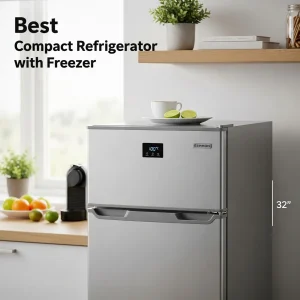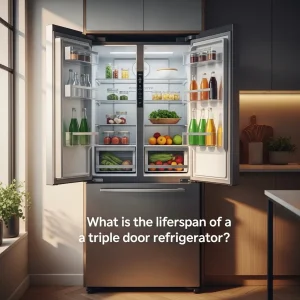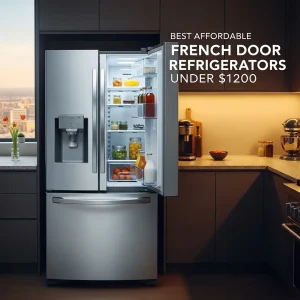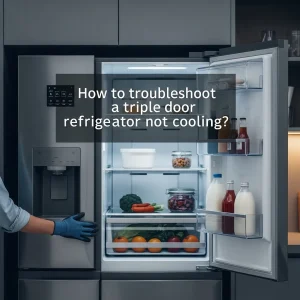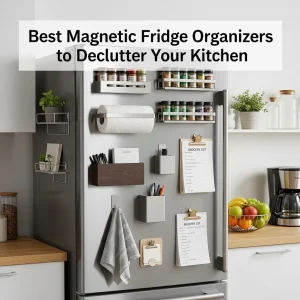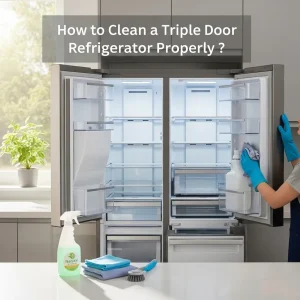There’s nothing more annoying than opening your fridge and finding no ice cubes when you expect a cold drink to chill. Your ice maker is supposed to be a simple convenience, but when it stops working, it throws off your whole routine. The ice maker plays a key role in keeping your beverages refreshing, especially on hot days or for unexpected guests. If it’s not producing ice, it could be a sign of a problem that’s easy to fix or one that needs more attention.
Let’s take a closer look at the main causes behind “Why Is My Refrigerator Not Making Ice Cubes?”.
“A clean filter keeps your ice fresh and your fridge running smoothly.” — Appliance Expert, John Carter
Common Reasons Your Refrigerator Is Not Making Ice
Ice makers usually stop working because of a few common issues. Knowing what might be wrong helps you fix it faster without calling for help right away.
Water Supply Issues
The ice maker depends on a steady flow of water. If the water supply lines get blocked or kinked, the ice production stops.
- Frozen lines: Sometimes water trapped in the supply tube freezes, cutting off the flow.
- Kinks or bends: A bent or pinched water line restricts water passage.
- Disconnected or loose connections: Water lines can loosen over time, breaking the supply.
You might notice no water coming out when the ice maker tries to fill or hear the motor running without ice getting made.
Freezer Temperature Problems

The ideal freezer temperature to make ice cubes is between 0°F and 5°F (-18°C to -15°C). If the freezer is too warm, ice won’t form, or formation will slow to a crawl.
- Temperature set too high prevents ice from freezing.
- Inconsistent temperature due to door openings or faulty seals can interrupt ice making.
- A broken thermostat might misread the freezer temperature.
Ice Maker Component Failures
Mechanical parts inside the ice maker can wear out or break.
- Faulty motor: Drives the ice ejector arm to release cubes; if broken, ice stays stuck.
- Ejector arm damages: If bent or jammed, it can’t remove ice properly.
- Electrical issues: Loose wires or broken sensors affect the ice maker’s function.
This kind of problem often requires checking the internal parts closely or professional repair.
Clogged or Frozen Water Filter
Your fridge likely has a water filter that removes impurities before water reaches the ice maker. When clogged:
- Water flow slows or stops, leading to no ice.
- Filters typically need replacement every 6 months to maintain flow.
- Ice might taste off if filter isn’t changed regularly.
A dirty filter might be the quiet culprit behind no ice.
Step-by-Step Troubleshooting for a Non-Working Ice Maker

Before calling a repair person, you can try some simple steps to bring your ice maker back to life.
Check and Clear the Water Supply Line
- Disconnect the water line from the ice maker.
- Inspect for ice blockages or kinks.
- If frozen, apply warm (not hot) cloths to gently thaw it.
- Straighten out any bends and ensure the line sits without pressure.
- Reconnect and test ice production.
Adjust Freezer Temperature Settings
- Find your freezer’s thermostat control.
- Set temperature between 0°F and 5°F (-18°C to -15°C).
- Keep the door closed for several hours to stabilize.
- Wait to see if ice production resumes.
Inspect and Reset the Ice Maker
- Look for jammed ice or broken parts in the ice tray.
- Remove any stuck ice cubes by hand.
- Press the reset button if your model has one (consult the manual).
- If no reset option, unplug the fridge for 5 minutes, then plug it back in.
- Observe if the ice maker restarts its cycle.
Replace Water Filter and Test
- Locate the fridge’s water filter.
- Remove the old filter and install a new, compatible filter.
- Run water through the dispenser to clear air bubbles.
- Allow 24 hours for ice production to improve.
- Monitor ice size and quantity.
When to Call a Professional for Ice Maker Repairs
If your ice maker still isn’t working after these steps, it may be time to bring in an expert.
Complex Mechanical or Electrical Issues
Problems like:
- Faulty motors or broken ejector arms.
- Malfunctioning electronic control boards.
- Hard-to-detect leaks inside the water supply system.
These repairs require special tools and experience.
Warranty and Safety Considerations
Check if your refrigerator is still under warranty before attempting major fixes. Some repairs can void warranties if done improperly. Also, always unplug your appliance before working on it for safety.
Choosing a Reliable Appliance Repair Service
Pick a technician who:
- Has good reviews and experience with ice makers.
- Offers clear pricing and guarantees.
- Is licensed and insured.
A trustworthy repair service saves you time, money, and future trouble.
Frequently Asked Questions for Why Is My Refrigerator Not Making Ice Cubes
How long does it take for a fridge to make ice after resetting?
Usually 24 hours. If no ice appears after that, check for other issues.
Can a dirty filter stop ice production?
Yes! A clogged filter blocks water flow, preventing ice from forming.
Why is my ice maker running but not making ice?
Likely a frozen water line or faulty valve. Thaw the line or inspect the valve.
“Regular maintenance can prevent most ice maker problems before they start.” — Appliance Repair Specialist, Lisa Monroe
Conclusion
A fridge that doesn’t make ice can slow your day down, but many causes are simple to spot and fix. Check your water supply lines, freezer temperature, ice maker parts, and water filter first. Keeping the freezer at the right temperature and changing the water filter on time will prevent many issues. If those quick fixes don’t work, professional help is the safe next step.
Don’t wait too long without ice—start troubleshooting today and get back to enjoying those cold drinks.


